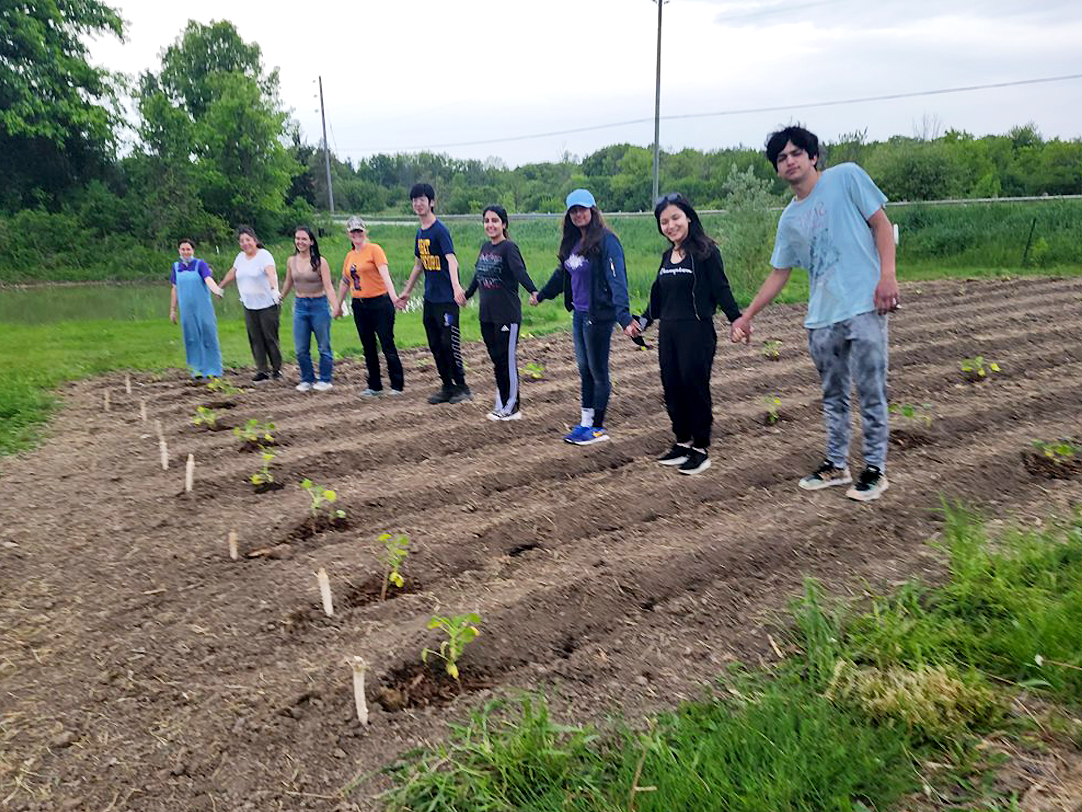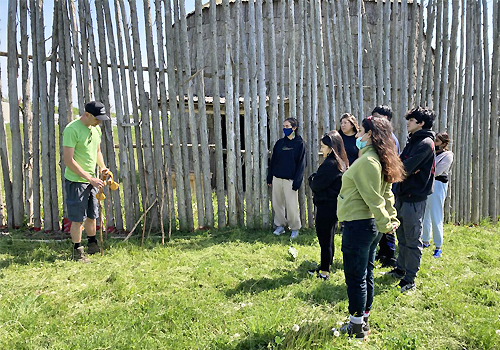The seven students from Melanie Jeffrey’s Indigenous Holistic Health International & Indigenous Course Module (ICM) reminded her of the “Seven Grandfather Teachings” in Indigenous culture: humility; bravery; honesty; wisdom; truth; respect; and love.
And she hopes her students absorbed elements of all of these teachings through the second-year human biology course that she created, designed and taught for the first time this summer.
Indigenous Holistic Health gave students the opportunity to understand how Indigenous practices and philosophies of holistic health can inform and complement mainstream health care and healing.
“So many students have questions about Indigenous health, they want to learn, but they don't know where to start,” says Jeffrey, an assistant professor cross-appointed to the Faculty of Arts & Science’s Human Biology program and the Centre for Indigenous Studies.
Jeffrey, who identifies as a settler of English, Irish and Scottish heritage, has a PhD in pharmacology and toxicology from U of T, and says working with Indigenous Peoples and allies has guided her teaching and research. Her research interests include land-based healing, determinants of health and bridging Indigenous knowledge systems and Western health and ecological sciences. She has also worked with Indigenous Peoples with spinal cord injuries, and has investigated the cancer burden in Indigenous communities in northern Ontario.

This course examined relationships between western biomedical science and Indigenous holistic health, exploring how the two models intersect. Students looked at western scientific themes through the lens of Indigenous science, using the four aspects of the medicine wheel — physical, mental, emotional and spiritual.
For Jeffrey, this was a dream course she always wanted to teach.
To start, she loved the small size, giving students the chance to really engage in a dialogue about the course materials and to build relationships with one another.
“It’s so important for students have a chance to be in a small class early in their degree,” she says. “For many students, it’s a completely different experience than they're used to. Most of their intro courses are some of the largest at the University.”
Another benefit for students was that the course relied heavily on guest speakers — faculty members, Indigenous Elders and Traditional Knowledge Keepers, and others. That was key, says Jeffrey. In fact, it was the crux of the course.
Examples include Joe Pitawanakwat — an Anishinaabe plant medicine teacher from Wiikwemkoong First Nation on Manitoulin Island — who spoke to the class about plants as teachers and medicines.
Seeing the student engagement, I was just so happy that it worked for them. And it worked for me. It was a transformative experience for all of us and that's exactly what education should be.
Brenda Wastasecoot, an assistant professor at the Centre for Indigenous Studies, spoke of the importance of ceremony and culture as they pertain to mental health.
And Sylvia Plain, from Aamjiwnaang First Nation, and the owner and operator of the Great Lakes Canoe Journey Education Program, spoke of the role of traditional practices and physical activity in wellness.
“We heard from a new guest speaker every week, exposing us to a multitude of perspectives, ideologies, and issues faced by Indigenous people in healthcare,” says Allana Nakashook-Zettler, a third-year chemical engineering student who took the Faculty of Arts & Science course to further explore her own Inuit heritage in an academic setting.
“Their knowledge is invaluable — and to see the cultural competency and awareness demonstrated by the speakers and Professor Jeffrey was amazing.”
The course’s grading system was also a little unconventional.
“There were no tests, and that's an important thing,” says Jeffrey. “Tests are very culturally centric, and they really don't work for some people. So I really focused on the assignment design.
“In a final assignment, I asked them to critically reflect on, ‘How has this learning affected you? What changed or surprised you about this learning journey? How will this inform your future self?’”
Much of that reflection came from a three-day field trip in May to a cultural teaching and learning facility run by Six Nations of the Grand, called Chiefswoods Park.
There, the students learned from Indigenous teachers about Indigenous history, plant ecology, medicinal plants and agriculture. The class also toured the White Pines Wellness Centre to see first-hand the services as well as the crucial role the centre provides in the community’s well-being.

The class also took part in historic traditional games including stickball. Regarded as the origin of lacrosse, stickball involves throwing two balls attached by a string with a stick with teams scoring on each other.
“It was welcome relief from some of the heavier material, and it was hilarious,” says Jeffrey.
Another highlight was a tour of Seedkeeper’s Garden, owned and operated by Terrylynn Brant. A Mohawk writer, she also mentors on food security, growing and preserving the heritage seeds of her people and revitalizing Indigenous agricultural ways.
“As a group, we prepared the soil for seedings by outlining the rows, hoeing, and laying soil,” says Nakashook-Zettler. “Then we planted corn seedlings of a type of corn she is working to revitalize, which was really impactful to me because it shows how resilient and hard at work Indigenous people are at maintaining cultural practices.”
For Sruthy Balakumar, a second-year life sciences student and member of St Michael's College, the field trip and the entire class will have a lasting impact.
“I will remember and use the skills I learned in this course through all aspects of my life,” says Balakumar, who is studying human biology and cell and molecular biology, and working towards a specialist in global health.
To hear from Indigenous people in their own words, to take students out on the land for land-based education, we need to do more of that.
“I met Elders, participated in land-based activities and gained a new perspective of looking at medical concerns, nutrition and community-based learning from an Indigenous lens.
“As a global health major, this course has given me a better understanding of a variety of relevant topics to my field including neuroscience, research ethics, nutrition and mental health.”
For Jeffrey, teaching the course was equally fulfilling.
“To hear from Indigenous people in their own words, to take students out on the land for land-based education, we need to do more of that,” she says.
“Seeing the student engagement, I was just so happy that it worked for them. And it worked for me. It was a transformative experience for all of us and that's exactly what education should be.”
The Faculty of Arts & Science’s ICM program provides an opportunity for the incorporation of an intensive international or Indigenous experiential module into the framework of existing undergraduate courses. ICMs usually take place over the November or February Reading Week, but an ICM can also take place in May for non-graduating students. ICMs are designed to enhance students’ classroom learning through the application of course content to relevant settings and communities around the globe.

